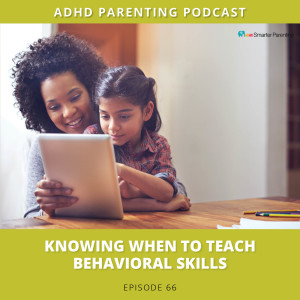
809.4K
Downloads
213
Episodes
Drawing on years of experience working with families, Parenting Coaches Siope Kinikini and Kimber Petersen share how families can improve, heal, and find success using the proven methods of the Teaching-Family Model. Visit smarterparenting.com to learn more.
Episodes

Wednesday Feb 05, 2020
Ep #66: Knowing when to teach behavioral skills
Wednesday Feb 05, 2020
Wednesday Feb 05, 2020
One of the biggest mistakes parents make in teaching behavioral skills is when they are teaching them. When a child or parent is upset, frustrated, or angry, that is the worst time for parents to be teaching a new behavior skill. If parents continually insist on teaching at times when a child isn't calm, it can damage the relationship.
If you want your child to get the most out of your teaching, parents need to be teaching at a neutral time. A neutral time means a time when you or your child aren't distracted, a time when they are calm and able to learn. Teaching behavior skills is all about helping kids learn and grow, and when you teach at a neutral time, you are encouraging them to find success. You show that you are concerned about what is happening in their life, which strengthens the relationship.
When teaching a new behavior skill, we recommend that parents teach the behavior skill long before it will be a problem and then Role-play with their child until they can do it on their own. By practicing it over and over until they are comfortable, your child understands what they need to do and has confidence they can do it.
For example, if your child has difficulty putting away their toys before bed, don't teach them the skill at bedtime. Instead, practice the skill with them multiple times throughout the day and showing them precisely what they need to do at bedtime by modeling what they need to do. Or, if they have difficulty turning off their video game, don't start teaching them to turn off their game when they are in the middle of a game. Instead, practice with them at a time when they aren't distracted by the game.
For things that are difficult for a child to do, it never hurts to reward a child for practicing. If they practice picking up their toys, they can earn five more minutes of playtime at bedtime. Or if they practice turning off their game, they can receive extra playtime.
When teaching our children, it's helpful to self-evaluate where we are. If we are feeling stressed or overwhelmed, we won't be effective in our teaching. Have you ever come home from work and see a backpack on the table instead of on a hook and get incredibly frustrated? It happens, and parents need to find things that allow them to bring their stress levels down before addressing the issue. It could be taking a walk or counting to ten. Then, once we are calm, we can better address the situation and to teach our child.
Children feel our stress and frustration and often respond in kind. On the other hand, if we are calm, our children will model that behavior.
The goal of teaching behavioral skills is changing a child's behavior to help them navigate the world without our help. Teaching at a neutral time will help you achieve this goal.
To learn the behavior skills on Smarter Parenting visit: https://www.smarterparenting.com/lesson/
For more information about how Smarter Parenting uses the Teaching-Family Model, visit the episode podcast page on SmarterParenting.com https://www.smarterparenting.com/adhd-parenting-podcast/
If you are looking for specific help, join the Smarter Parenting Club. https://club.smarterparenting.com/
